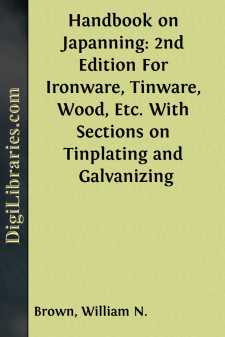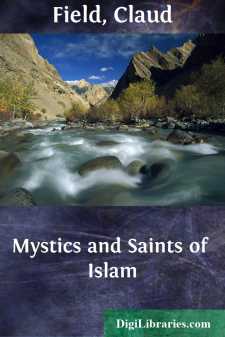Non-Classifiable
- Non-Classifiable 1768
Non-Classifiable Books
Sort by:
by:
William N. Brown
INTRODUCTION. Japanning, as it is generally understood in Great Britain, is the art of covering paper, wood, or metal with a more or less thick coating of brilliant varnish, and hardening the same by baking it in an oven at a suitable heat. It originated in Japan—hence its name—where the natives use a natural varnish or lacquer which flows from a certain kind of tree, and which on its issuing from...
more...
INTRODUCTION The Letter to Dion, Mandeville's last publication, was, in form, a reply to Bishop Berkeley's Alciphron: or, the Minute Philosopher. In Alciphron, a series of dialogues directed against "free thinkers" in general, Dion is the presiding host and Alciphron and Lysicles are the expositors of objectionable doctrines. Mandeville's Fable of the Bees is attacked in the...
more...
by:
Sherwin Cody
CHAPTER I HIS CHILDHOOD The Revolutionary War was over. The British soldiers were preparing to embark on their ships and sail back over the ocean, and General Washington would soon enter New York city at the head of the American army. While all true patriots were rejoicing at this happy turn of affairs, a little boy was born who was destined to be the first great American author. William Irving, the...
more...
INTRODUCTION TO redeem the monotony of plain surfaces has ever been the aim of all the arts, but especially that of the needle, which being the oldest expression of decorative intention, has, from the earliest time, been very dependent on its groundwork for its ultimate results. This is particularly the case in embroideries of the type of what is commonly known as Jacobean, where the ground fabric is...
more...
INTRODUCTION. Fourteen years ago the author came to Quaker Hill as a resident, and has spent at least a part of each of the intervening years in interested study of the locality. For ten of those years the fascination of the social life peculiar to the place was upon him. Yet all the time, and increasingly of late, the disillusionment which affects every resident in communities of this sort was...
more...
by:
Claud Field
PANTHEISTIC SUFISM I.—THE IMPORT OF ISLAMIC MYSTICISM The moral law proclaimed by Moses three thousand years ago agrees with that which governs men to-day, irrespective of their various stages of culture; the moral precepts of a Buddha and Confucius agree with those of the Gospel, and the sins for which, according to the Book of the Dead of the ancient Egyptians, men will answer to the judges of the...
more...
by:
Monsieur L'Abbat
CHAP. I. Of chusing and mounting a Blade. Courage and Skill being often of little Use without a good Weapon, I think it necessary, before I lay down Rules for using it, to shew how to chuse a good Blade, and how it ought to be mounted. The Length of the Blade ought to be proportionable to the Stature of the Person who is to use it: The longest Sword, from Point to Pommel, should reach perpendicularly...
more...
Sir Walter Scott When I was asked to choose a subject for a lecture at the Sorbonne, there came into my mind somehow or other the incident of Scott's visit to Paris when he went to see Ivanhoe at the Odéon, and was amused to think how the story had travelled and made its fortune:— 'It was an opera, and, of course, the story sadly mangled and the dialogue in great part nonsense. Yet it was...
more...
by:
John Morley
There was a moment in the last century when the Gallican church hoped for a return of internal union and prosperity. This brief era of hope coincided almost exactly with the middle of the century. Voltaire was in exile at Berlin. The author of the Persian Letters and the Spirit of Laws was old and near his end. Rousseau was copying music in a garret. The Encyclopædia was looked for, but only as a...
more...
by:
Mildred Cable
INTRODUCTIONTWENTY-ONE years ago, on 19th February 1896, Pastor Hsi, to quote the words of his biographer, "was translated to higher service." Those who read the fascinating and wonderful story of his life by Mrs. Howard Taylor will at once be interested inThe Fulfilment of a Dream, which is the story of the work in Hwochow, and gives the account of the carrying on of the spiritual labour of...
more...











